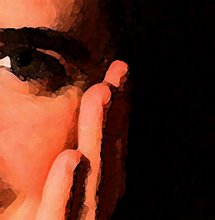Flipping through my dictionary, I found this somewhat relevant "I" word which means:
Introductory study; especially, the study of the literary history of the Bible, considered as introductory to the study of Bible interpretation.
Yesterday at synagogue, we started a fresh round of Torah reading with the first part of the creation story. But before anyone uttered the first word, "B'reishit" (normally translated as "in the beginning"), our rabbi gave a brief overview of the different ways or levels in which the Torah can be read.
There is the peshat (surface) level, where each word is taken literally. Of course, even peshat isn't so simple, as certain words can have multiple meanings and there are some words that appear in the Torah only once, making it difficult to be completely sure what that meaning is. And plenty of the words in the Torah derive from even more ancient languages (how's your Ugaritic?) or refer to things, places or creatures that no longer exist. The next level is called remez, focusing on allusions or allegories in the text. The third level is called derash, where we look to the text in the Torah to answer a contemporary question, teasing out relevance with creative interpretations. In other words, we take the stories as written and make up new stories to breathe life into the text. And finally we can read Torah on the level of sod, the hidden and mystical.
Our Torah study session on Saturday mornings (before services start) is just a therapist's hour in length (we're lucky if we're at it for a full 50 minutes), and you could spend multiples of that time discussing just the first few verses of the Old Testament on all four levels, especially when you have a group of 30+ people, many of whom have something valuable to share.
In fact, one could spend a long time discussing just the third word of Genesis, "Elohim", which is in plural form even though it just refers to a singular God. Is it possibly a reference to the fact that at the time the Old Testament was written people believed that a whole group of gods had created the earth? Read in such a way, the Bible raises more questions than it answers. And our rabbi reminded us that even though the creation story is lovely and rather poetic (e.g. "God divided the light from the darkness" and "Let there be a firmament in the midst of the waters, and let it divide the waters from the waters"), in a few chapters God gets upset and destroys it all (you know, the flood!).
Sounds to me like God is an artist who, displeased with her first attempt at creating, wrecks it and tries, tries again. It is comforting to remember that even God didn't get things right the first time. The other piece that stuck with me is the idea that God created the world with words - not with a magic wand, not with esoteric gestures, not with a great wind.
Words.
And so we create our own worlds with our words. The words we use to describe the people and situations in our lives are like paints. Do we pick the ones that create a hopeful and inspiring picture or choose words that perpetuate negativity and confusion? Can we step back from our experience and look at it, much like a painter steps back to examine her canvas, and find words to describe it that are positive and encouraging?
I often feel like I need to (re)write my own story, starting once again with b'reishit, in the beginning, developing a plot from a much kinder and compassionate place than I've been able to access during previous drafts.
Sunday, October 7, 2007
Subscribe to:
Post Comments (Atom)




No comments:
Post a Comment